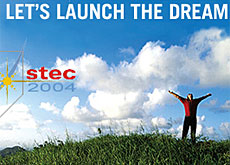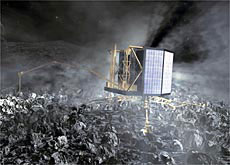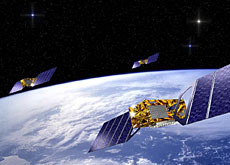University reaches for the stars

The Federal Institute of Technology in Lausanne is promoting itself as a focal point for space research and development in Switzerland.
The institute, which boasts the country’s only astronaut, Claude Nicollier, among its staff, is expected to announce shortly the official launch of a new “Space Center”.
Its mission will be to coordinate the institute’s own space research with that of its partners.
“We don’t want it to be a mini space agency or an academic centre. It will be more of a platform to coordinate projects,” said Roland Siegwart, a professor who is expected to run the new centre.
The institute’s partners include private industry and other research organisations, such as Neuchâtel’s Swiss Center for Electronics and Microtechnology.
“We face the same difficulties, so it makes sense for people to work together,” said the institute’s spokesman, Nicolas Henchoz. “It will give us more weight and make our research more widely known.”
“There will be only one point of contact, the Space Center, which will be aware of all ongoing projects,” added Henchoz.
Research role
Siegwart is confident the Swiss can play a bigger role in space research once all the pieces are in place.
“I think Switzerland can be a global force for space exploration micro-systems,” he said. “But we have to improve project coordination, and that will be the centre’s role.”
Swiss technology has been on board when recent European and American space missions have lifted off.
Cameras were supplied for the European Space Agency’s (ESA) failed Beagle 2 Mars mission, and Swiss motors were used on two American robot vehicles that have been exploring the surface of the Red Planet.
Nicolas Henchoz says that while large amounts of money are spent on space exploration, the investment brings many terrestrial benefits. Past developments, such as Teflon and Velcro, are now part of daily life.
“Space research can have some very interesting applications,” he told swissinfo. “You have to build, for example, extremely reliable electronic circuits that can monitor themselves, a development that could be useful to many people.”
Scientists say new robots, solar cells, low-power transmission systems, electrical motors and optical devices will be developed as part of the push to explore space.
Space fever
The launch of the new centre in Lausanne coincides with the first lectures given at the institute by Nicollier – almost a decade after he became a faculty member.
His classes, which focus on space technology and operations, have attracted around 140 students.
For the past four years, a group of students at the institute have been taking part in the Student Space Exploration and Technology Initiative (SSETI).
The aim of the ESA-backed programme is to build a micro-satellite by networking resources from 21 European universities. The satellite, which would test different technologies, could be ready for launching this year.
Students from all over Europe have been meeting this week in Lausanne to discuss the project, as well as talking to industry and ESA representatives.
“This shows how much interest there is for space research here in Lausanne,” said Siegwart.
swissinfo
Switzerland was a founding member of the ESA and contributes SFr120 million ($92.5 million) every year towards its budget.
Approximately 80 per cent of this money flows back into Switzerland in the form of contracts and research funding.
Around 800 people work directly for the Swiss space industry, but if sub-contractors are included, that number rises to over 2,000.

In compliance with the JTI standards
More: SWI swissinfo.ch certified by the Journalism Trust Initiative



You can find an overview of ongoing debates with our journalists here. Please join us!
If you want to start a conversation about a topic raised in this article or want to report factual errors, email us at english@swissinfo.ch.